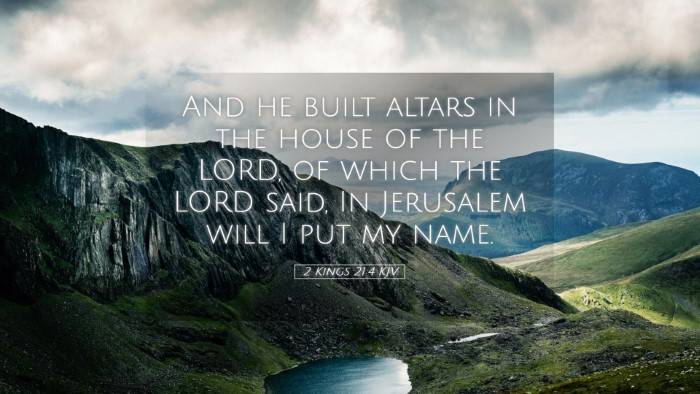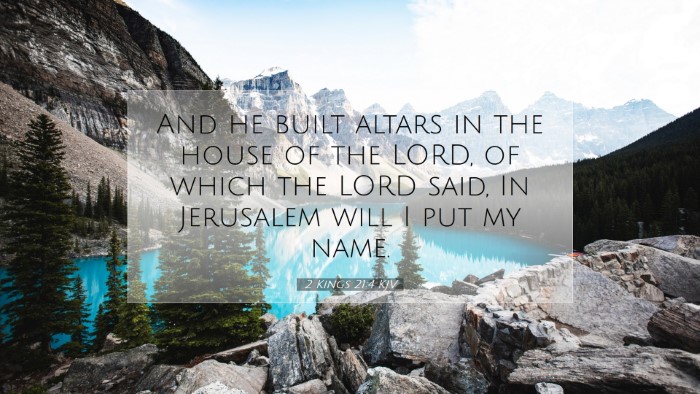Commentary on 2 Kings 21:4
Bible Verse: "And he built altars in the house of the LORD, of which the LORD said, In Jerusalem will I put my name." (2 Kings 21:4)
Introduction
The reign of Manasseh is depicted in 2 Kings 21 as a dark period in the history of Judah, marked by idolatry and a blatant disregard for the commandments of the LORD. This verse encapsulates the gravity of King Manasseh's actions, as he constructs altars in the house of the LORD, thereby inviting corruption into the very place that was supposed to be a sanctuary for divine worship.
Summary of Commentaries
Insights from Matthew Henry
Matthew Henry emphasizes the severity of Manasseh's idolatry, noting that he not only built altars but did so within the precincts of the Temple itself, which was consecrated for the worship of Yahweh. According to Henry, this act represented a tremendous affront to God, as it directly contradicted the divine command given in Deuteronomy 12:5, where God explicitly stated that He would choose a place for His name, and that worship should only be offered there.
Henry elaborates on the implications of such actions: "By preferring the worship of idols to that of Jehovah, Manasseh desecrated the place that was to be the throne room of God, leading the people into spiritual perdition." He points out that Manasseh's actions significantly contributed to the apostasy of Israel, drawing the nation into a cycle of sin that would have profound consequences.
Insights from Albert Barnes
Albert Barnes focuses on the theological ramifications of the building of altars within the Temple. He comments on the irony that here, in the house of the LORD—marked by the presence of His name—Manasseh chose to erect altars to pagan gods. Barnes states that this act highlights a spirit of rebellion against God, where the very instruments of worship become the place of sin and idolatry.
He explains that this reflects the recurring theme in Israel’s history of a lapse into idolatry, warning that when leaders stray from God's commandments, they not only jeopardize their own salvation but lead their people down the same path. He draws parallels between Manasseh and the broader human tendency to forsake divine truths for temporal pleasures and popularity.
Insights from Adam Clarke
Adam Clarke provides a comprehensive analysis of the phrase “built altars in the house of the LORD.” He notes that this act signifies a profound violation of the covenant relationship between God and His people. Clarke suggests that Manasseh’s altars demonstrate a calculated abandonment of the worship of the true God, prioritizing instead the gods of the surrounding nations.
Moreover, Clarke discusses the implications of such worship practices, indicating that they serve as a dismal warning for contemporary believers about the dangers of syncretism—the blending of faith with secular ideologies. He calls for vigilance in maintaining the purity of worship and reprimands the inclination to compromise spiritual beliefs for societal acceptance.
Major Themes and Applications
1. The Sanctity of Worship
The fact that altars were built in the house of the LORD underscores the significance of sanctity in worship. As pastors and scholars, there is a call to examine how modern worship practices align with biblical mandates. The integrity of worship must be preserved, ensuring that the focus remains on God and His holiness, rather than succumbing to cultural pressures that dilute or distort true worship.
2. The Dangers of Idolatry
Manasseh’s actions serve as a stark reminder of the perils of idolatry, which can take many forms in today's context. This passage encourages leaders to be vigilant in identifying and confronting the idols of wealth, power, and cultural acceptance that may infiltrate the church. The allegiance to God must remain paramount, devoid of compromising influences that threaten the authenticity of faith.
3. Consequences of Leadership
The narrative arc of Manasseh’s reign illustrates the profound impact that leadership can have on a community's spiritual direction. The lessons here are significant for students of theology and church leaders alike: the behavior and convictions of leaders inevitably shape the people they guide. Thus, ethical and spiritual integrity in leadership is essential to fostering a healthy, thriving community of faith.
Conclusion
The actions of King Manasseh, particularly the building of altars within the house of the LORD, encapsulate a profound lesson about the sanctity of worship, the dangers of idolatry, and the significant responsibilities of spiritual leadership. As we reflect on 2 Kings 21:4, it invites scholars, pastors, and laypeople to recommit to a pure worship of the true God, to stand against the currents of cultural idolatry, and to embody integrity in leadership as a reflection of God's holiness within their communities.


